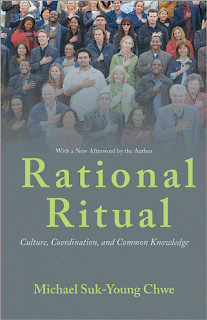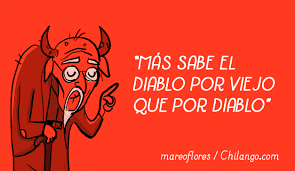Rational Ritual and Social Change
Mature, public conversation about issues that matter is foundational for democratic society. I am delighted that Mark Zuckerberg's "A Year of Books" offers such an opportunity. To contribute to that dialog, I will offer commentary on each of the readings proposed by Zuckerberg.
I'd love to hear about Mark Zuckerberg's process in selecting the works for his series. It feels like the syllabus of a class, mixed between academic and popular writing. I'd love to know from whom he received the various recommendations. As, I suppose he has not read them at the time of making the announcement, it would be difficult to imagine how he sees them building on one another, but I would love to hear him articulate how they interact in his heart and mind.
Zuckerberg's seventh selection, Rational Ritual: Culture, Coordination, and Common Knowledge by Michael Suk-Young Chwe, popularizes serious academic work in game theory. Steven Pinker (Zuckerberg's second book) cites Chwe (pronounced like "chess" without the "ss") several times in his endnotes. After the selection of his work by Zuckerberg, Chwe authored a reaction and summary of his work and its implications found here in the Washington Post.
Chwe, a professor of political science at UCLA, earned his bachelor's at Caltech before earning a Ph.D. in economics at Northwestern University. He taught economics at the University of Chicago and political science at New York University before assuming his post at UCLA.
Chwe, a Korean American, seems eminently likable with his generous offer of signed bookplates, his delight in Jane Austin, and his affection for the classic film "On the Waterfront." Analysis of Super Bowl advertising becomes the baseline for understanding critical concepts of game theory as applied to common knowledge. His research also shows great interest in social movements, and, unlike Pinker, he seems more respectful of the contributions of religion and religious ritual.
I have a specific experience of ritual as a lifelong Catholic and my sixteen years leading liturgy as a priest, as well as reflecting theologically upon those liturgies. A game theorist, Chwe uses different categories but sees powerful dynamics in ritual as it builds "common knowledge" and helps solve "coordination problems." He observes that:
I also see this book through the experience of community organizing. Chwe's description of game theory to consider people's participation in a political action (p. 12, pp. 61-66) tracks well the organizer's concern about how many people will attend a given action. Efforts like one-on-ones (individual meetings to build public relationships), the regular format of meetings, the tension in public meetings, and the process of evaluation build and leverage common knowledge.
Chwe's reflections of "On the Waterfront" bring together both of my personal interests then. While Marlon Brando won the Oscar for Best Actor, I love the character of Fr. Barry, portrayed by Karl Malden, a labor priest. The character was based upon the real life Fr. John M. Corridan. Chwe observes how the film illustrates his theory of coordination problems and common knowledge (pp. 33-36). In my eyes, Fr. Barry was a great priest and a community organizer.
I also can see how Mark Zuckerberg might be interested in examining Facebook and its capacity to generate common knowledge and solve coordination problems. How much common knowledge does a "like," a "share," or a comment generate? Chwe examines social movements through the lens of game theory.
Chwe offers compelling reasons to believe that ritual, broadly seen, indeed generates common knowledge and leads to action that might occasion the insurrection of justice. Ritual is not just a text to be read, but it helps create history. It also offers a deep narrative for a community: "You cannot argue with a song" (italics in the original, p. 29).
We live in a world that is increasingly divided, separate television news sources in the U.S. for the Left and the Right. Fox News and MSNBC, borrowing a phrase from a different context, are examples of "the electronic equivalents of gated communities" (p. 92). Nonetheless, ritual can transform us. Mahatma Gandhi marched to the sea and made salt. Martin Luther King, Jr. and the civil rights movement marched from Selma to Montgomery. Game theory provides a lens to see how ritual can generate common knowledge and coordinated action that changes our world.
So, I will conclude with Chwe's own observation:
I'd love to hear about Mark Zuckerberg's process in selecting the works for his series. It feels like the syllabus of a class, mixed between academic and popular writing. I'd love to know from whom he received the various recommendations. As, I suppose he has not read them at the time of making the announcement, it would be difficult to imagine how he sees them building on one another, but I would love to hear him articulate how they interact in his heart and mind.
Zuckerberg's seventh selection, Rational Ritual: Culture, Coordination, and Common Knowledge by Michael Suk-Young Chwe, popularizes serious academic work in game theory. Steven Pinker (Zuckerberg's second book) cites Chwe (pronounced like "chess" without the "ss") several times in his endnotes. After the selection of his work by Zuckerberg, Chwe authored a reaction and summary of his work and its implications found here in the Washington Post.
 |
| Michael Chwe (photo: Reed Hutchinson, UCLA) |
Chwe, a Korean American, seems eminently likable with his generous offer of signed bookplates, his delight in Jane Austin, and his affection for the classic film "On the Waterfront." Analysis of Super Bowl advertising becomes the baseline for understanding critical concepts of game theory as applied to common knowledge. His research also shows great interest in social movements, and, unlike Pinker, he seems more respectful of the contributions of religion and religious ritual.
I have a specific experience of ritual as a lifelong Catholic and my sixteen years leading liturgy as a priest, as well as reflecting theologically upon those liturgies. A game theorist, Chwe uses different categories but sees powerful dynamics in ritual as it builds "common knowledge" and helps solve "coordination problems." He observes that:
A public ritual is not just about the transmission of meaning from a central source to each member of an audience; it is also about letting audience members know what other audience members know. (p. 4)Chwe constructs a more complex theory about the interaction of the words, songs, and seating arrangements (pp. 25-30). It paralleled in interesting ways my formation in liturgy. From Greek, "liturgy" etymologically means "the work of the people." When it is seen as "the work of the priest," it is sadly reduced. Liturgy helps us in difficult times, like at death, with ritualized words in the funeral. Those ritualized words give us a language when words otherwise fail us or elude us. Liturgies, like the Eucharist, are also subversive, inviting us, for example, into deeper solidarity, especially with the most needy, and more peaceable, non-violent ways of living. While seeing ritual through distinct lenses and with different language, I believe that Chwe's analysis is open to observe a similar dynamic.
I also see this book through the experience of community organizing. Chwe's description of game theory to consider people's participation in a political action (p. 12, pp. 61-66) tracks well the organizer's concern about how many people will attend a given action. Efforts like one-on-ones (individual meetings to build public relationships), the regular format of meetings, the tension in public meetings, and the process of evaluation build and leverage common knowledge.
Chwe's reflections of "On the Waterfront" bring together both of my personal interests then. While Marlon Brando won the Oscar for Best Actor, I love the character of Fr. Barry, portrayed by Karl Malden, a labor priest. The character was based upon the real life Fr. John M. Corridan. Chwe observes how the film illustrates his theory of coordination problems and common knowledge (pp. 33-36). In my eyes, Fr. Barry was a great priest and a community organizer.
I also can see how Mark Zuckerberg might be interested in examining Facebook and its capacity to generate common knowledge and solve coordination problems. How much common knowledge does a "like," a "share," or a comment generate? Chwe examines social movements through the lens of game theory.
Chwe offers compelling reasons to believe that ritual, broadly seen, indeed generates common knowledge and leads to action that might occasion the insurrection of justice. Ritual is not just a text to be read, but it helps create history. It also offers a deep narrative for a community: "You cannot argue with a song" (italics in the original, p. 29).
We live in a world that is increasingly divided, separate television news sources in the U.S. for the Left and the Right. Fox News and MSNBC, borrowing a phrase from a different context, are examples of "the electronic equivalents of gated communities" (p. 92). Nonetheless, ritual can transform us. Mahatma Gandhi marched to the sea and made salt. Martin Luther King, Jr. and the civil rights movement marched from Selma to Montgomery. Game theory provides a lens to see how ritual can generate common knowledge and coordinated action that changes our world.
So, I will conclude with Chwe's own observation:
If you only have time to read one book #AYearOfBooks (just saying) pic.twitter.com/a2CmVCRyVQ
— Michael Chwe (@michael_chwe) April 7, 2015





Comments
Post a Comment